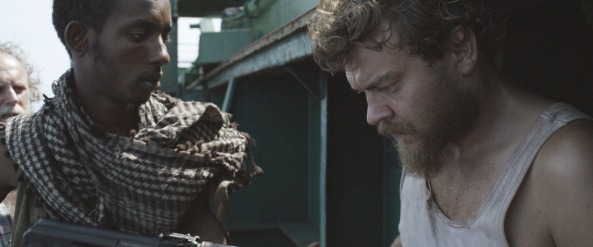 “A War,” the Danish film nominated for this year’s Best Foreign Language Oscar, is the rare war film to consider a soldier’s practical war as well as a moral one. It’s not just about coping with life after war, but about how a soldier faces hard decisions and consequences upon returning home.
“A War,” the Danish film nominated for this year’s Best Foreign Language Oscar, is the rare war film to consider a soldier’s practical war as well as a moral one. It’s not just about coping with life after war, but about how a soldier faces hard decisions and consequences upon returning home.
Claus (Pilou Asbæk) is a commanding officer leading patrols of local villages in Afghanistan. A 21-year-old under his command dies from an IED and his platoon begins to question why they’re risking their lives. Claus’s message is a humanitarian one of needing to protect the local communities, and already this war film has a different feel from the flag-waving American actioners.
It’s all slow burn suspense until on one campaign Claus and his squad is pinned down by enemy fire in a chaotic battle in which we never actually see the attackers. Claus orders an air strike and saves the life of one of his men. The heroics are handled modestly, with the wounded warrior via a remote satellite feed communicating his gratitude through an amusing series of paper signs. But awaiting Claus is an accusation that he bombed a region without having visual confirmation of the enemy’s presence, ultimately killing civilians as a result.
The chaos of that scene actually serves a narrative purpose. The back half of “A War” becomes a courtroom drama in which Claus faces charges that all hinge on what exactly happened. Director and screenwriter Tobias Lindholm poses a practical dilemma in which a good man who made a tough decision in the heat of the moment, choosing one life over the lives of innocents, now has to face the consequences at the hand of the country he serves.
Lindholm previously wrote and directed the equally modest drama “A Hijacking”(also starring Asbæk), a film that, like “A War,” concerns a man trapped in a practical dilemma imposed by a broader institution, not just an internal moral conflict. But “A Hijacking” made villains out of the larger institutions and had plenty to say about human nature on a broader scope. “A War” is heavy courtroom drama but doesn’t raise as many questions about the purpose of such a military campaign or the nature of the law. We only fear Claus’ unfortunate fate, in which if he served jail time, he would have to leave his wife Maria (Tuva Novotny) and three children.
“A War” also struggles to find its footing and energy until it returns to the home front in its second hour. Part of that hinges on how Lindholm constructs melodrama. Time and again Claus’s moral decisions boil down to the lives of children. One terrorist uses a local boy as a human shield against sniper fire. Another Afghani father pleads with Claus to allow his children to stay protected on the military base. And Maria, who receives surprisingly ample screen time, is on the brink of being overwhelmed with their kids. If Claus gets convicted, the kids are at risk yet again. It’s carefully calculated to make Claus appear to be a good man, but it’s drama centered more around easy plot devices rather than complex character growth.
But American and foreign war films never even begin to tackle the institutional issues Lindholm’s “A War” does even superficially. It’s at war with the idea of what a war film can be.
3 stars
 In what universe does Thomas Vinterberg’s “The Commune” make sense? The thinly drawn characters in this stagey, maudlin, histrionic dreck seem driven by pages that must’ve vanished from the script. They leap from broad character types to wild hippies in no time flat, act completely out of line and ultimately enable the film’s dirtbag protagonist to carry on an affair. Chalk it up to the lifestyles of those crazy Danes, I guess.
In what universe does Thomas Vinterberg’s “The Commune” make sense? The thinly drawn characters in this stagey, maudlin, histrionic dreck seem driven by pages that must’ve vanished from the script. They leap from broad character types to wild hippies in no time flat, act completely out of line and ultimately enable the film’s dirtbag protagonist to carry on an affair. Chalk it up to the lifestyles of those crazy Danes, I guess.
 “A War,” the Danish film nominated for this year’s Best Foreign Language Oscar, is the rare war film to consider a soldier’s practical war as well as a moral one. It’s not just about coping with life after war, but about how a soldier faces hard decisions and consequences upon returning home.
“A War,” the Danish film nominated for this year’s Best Foreign Language Oscar, is the rare war film to consider a soldier’s practical war as well as a moral one. It’s not just about coping with life after war, but about how a soldier faces hard decisions and consequences upon returning home.